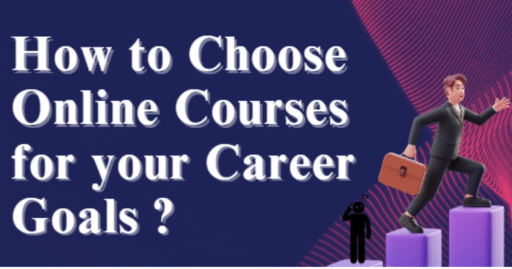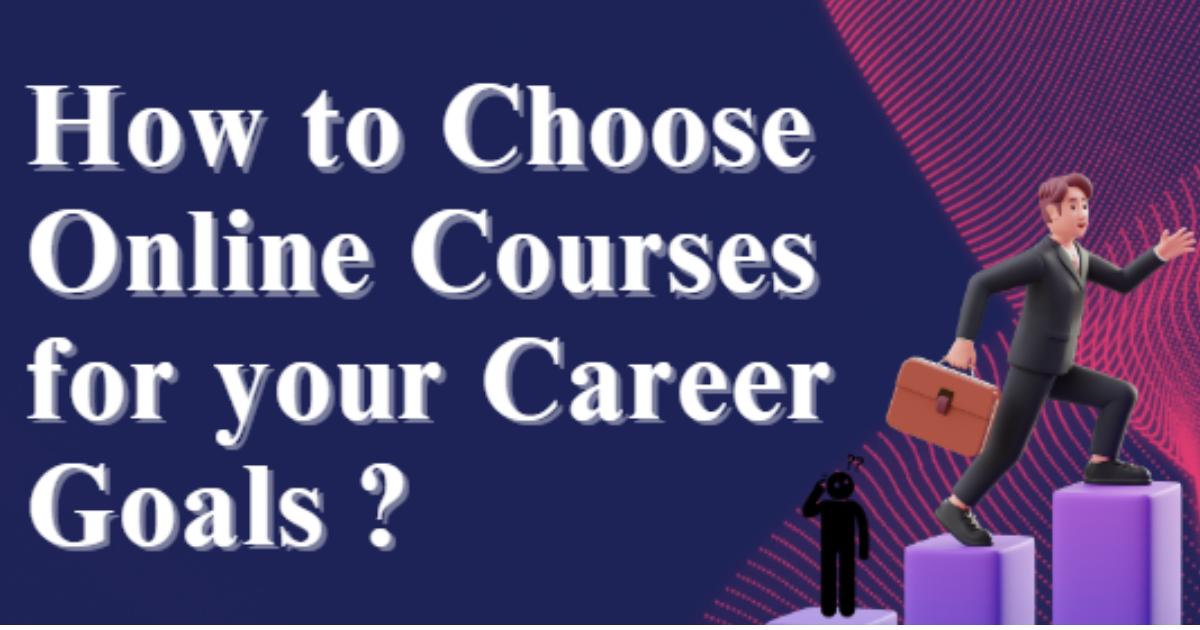In today’s rapidly evolving digital landscape, building a successful career often depends on acquiring the right skills—and acquiring them quickly. Traditional college degrees are no longer the only path to professional growth. Online career courses now offer flexible, affordable, and fast-tracked learning opportunities tailored to your personal and professional aspirations. But with thousands of options available, how do you choose the course that truly aligns with your goals?
This guide will help you evaluate which online career course is right for you by examining your career objectives, learning preferences, industry trends, and the credentials that matter most.
Understanding Your Career Goals

Before diving into any online career course, it’s essential to have a clear understanding of your career goals. Knowing where you want to go professionally will help you choose the right course that aligns with your aspirations, skills, and future opportunities.
Why Define Your Goals First?
Before selecting an online course, it’s essential to define your short-term and long-term career goals. Knowing your goals provides a roadmap for:
- Choosing the right specialization
- Avoiding unnecessary certifications
- Staying motivated throughout your course
Ask Yourself These Questions:
- What job role do I see myself in over the next 1–3 years?
- Am I switching careers or enhancing my current skill set?
- What skills am I lacking right now?
- What are the in-demand qualifications in my desired field?
Why Consider an Online Career Course?

In the digital age, learning is no longer confined to classrooms or rigid schedules. Online career courses have revolutionized how people gain new skills, transition into different industries, and stay relevant in a constantly evolving job market. Whether you’re a recent graduate, a mid-career professional, or someone exploring a career change, online courses offer compelling advantages.
Online career courses have grown significantly in recent years. Thanks to advancements in technology and the growing demand for flexible learning, professionals and students alike can now upskill or reskill from the comfort of their own homes.
Benefits of Online Courses
Online courses have transformed the landscape of education and professional development. Whether you’re looking to gain new skills, earn a certification, or pivot into a new industry, online learning platforms offer a wide range of advantages that make learning more accessible, flexible, and impactful than ever before.
- Learn at your own pace
- Affordable compared to traditional degrees
- Access to global instructors and resources
- Relevant, up-to-date industry content
- Certificate or diploma upon completion
- No geographical limitations
Define Your Career Goals
Before enrolling in any course, it’s crucial to reflect on where you are in your career journey and where you want to go.
Questions to Ask Yourself
- What industry or job role are you aiming for?
- Are you seeking a promotion or changing careers?
- What skills do you lack that are crucial for your desired role?
- Do you need a certification to validate your skills?
Defining your end goal will help you choose a course aligned with your professional needs and ambitions.
Identify the Right Industry and Skillset

Different career paths require different types of skills and certifications. Here’s a look at some popular industries and their in-demand skills.
Technology and IT
- Web Development
- Data Science
- Cybersecurity
- Artificial Intelligence
- Cloud Computing
Recommended Platforms: Coursera, Udacity, Google Career Certificates
Business and Management
- Digital Marketing
- Project Management
- Business Analytics
- HR Management
Recommended Platforms: LinkedIn Learning, edX, Skillshare
Creative Fields
- Graphic Design
- UX/UI Design
- Content Writing
- Photography and Video Editing
Recommended Platforms: Udemy, Domestika, Skillshare
Finance and Accounting
- Financial Analysis
- Investment Banking
- Accounting Tools (QuickBooks, Excel)
Recommended Platforms: Coursera, Corporate Finance Institute (CFI)
Evaluate Course Features
Once you’ve identified your target field, it’s time to evaluate the course options. Not all courses are created equal.
Accreditation and Reputation
- Is the course provided by a well-known university, company, or instructor?
- Is it accredited or endorsed by industry leaders?
Curriculum Depth
- Does the syllabus match the job requirements you’re aiming for?
- Are real-world projects or case studies included?
Flexibility and Duration
- Is the course self-paced or time-bound?
- How many hours per week are required?
Certification and Recognition
- Does the course offer a verifiable certificate?
- Is the certification recognized by employers?
Cost and Return on Investment (ROI)
- Is the course within your budget?
- Does the expected outcome justify the cost?
Match Course to Your Career Stage
For Beginners
If you’re just starting out or making a complete career switch:
- Choose introductory courses
- Look for beginner-friendly platforms like Coursera or Udemy
- Seek courses that offer foundational knowledge
Examples:
- “Google IT Support Certificate” (Coursera)
- “Introduction to Digital Marketing” (LinkedIn Learning)
For Mid-Level Professionals
Looking to advance or shift within the same industry?
- Choose specialized or intermediate-level courses
- Focus on certifications that improve your promotion chances
Examples:
- “PMP Certification Training” (Simplilearn)
- “Advanced Excel for Data Analysis” (edX)
For Career Changers
Transitioning into a new domain?
- Look for bootcamps or intensive courses
- Choose job-guarantee programs if available
Examples:
- “Full Stack Web Developer Nanodegree” (Udacity)
- “Data Analytics Career Track” (Springboard)
Explore Popular Online Learning Platforms
Coursera
- Offers university-backed courses
- Professional certificates from Google, IBM, and Meta
- Subscription-based or one-time payment
Udemy
- Massive variety of affordable courses
- Lifetime access to course material
- Regular sales with huge discounts
edX
- University-level content from MIT, Harvard, etc.
- MicroMasters and Professional Certificates
- Some free-to-audit options
LinkedIn Learning
- Courses tied to your LinkedIn profile
- Offers career paths and skill development badges
- Monthly subscription model
Skillshare
- Focused on creative and business skills
- Project-based learning
- Great for freelancers and creatives
Tips for Maximizing Your Online Course Experience
Set SMART Learning Goals
- Specific
- Measurable
- Achievable
- Relevant
- Time-bound
Create a Learning Schedule
Dedicate consistent time blocks each week to study, just like you would in a traditional class.
Engage with the Community
Join discussion forums, peer groups, or LinkedIn groups related to your course.
Apply Your Knowledge
Start personal projects, freelance gigs, or internships to build your portfolio as you learn.
Also Read : The Future Of Higher Education: Trends In University Learning
Conclusion
Online career courses are a powerful tool for professional growth, but the right one depends entirely on your goals, background, and commitment level. Whether you’re just beginning your journey, looking for a promotion, or exploring a new field, the right course can transform your career trajectory.
Take the time to define your goals, evaluate course content, and invest in a program that offers real-world skills, recognized credentials, and the flexibility to learn at your pace.
Your future is in your hands—choose a course that helps you build the career you truly want.
FAQs
1. How do I know if a course is right for my career goals?
Start by identifying your desired job role and the skills it requires. Then match those skills to the course syllabus and outcomes.
2. Are paid online courses better than free ones?
Paid courses often offer more comprehensive content, instructor support, and verifiable certificates. However, free courses are great for exploring topics before investing.
3. Do employers value online course certificates?
Yes, especially if they come from reputable platforms like Google, Harvard (edX), or Microsoft. Be sure to list them on your resume and LinkedIn.
4. How long does it take to complete an online career course?
It depends on the course. Some take 4–6 weeks, while others may take several months if they are comprehensive bootcamps or diploma-level programs.
5. Can I get a job after completing an online course?
Yes, many learners land jobs post-course completion, especially if they gain in-demand skills and showcase them through portfolios or certifications.
6. Should I take multiple courses at once?
It’s better to focus on one course at a time, especially if it’s intensive. Quality learning trumps quantity.
7. What if I don’t know what career I want yet?
Start with general skill courses such as communication, basic business, or computer literacy to help you explore different paths.


